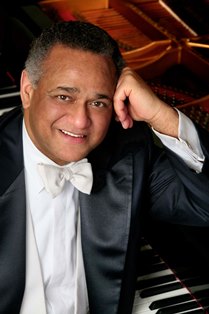
Watts Magisterial in CSO Appearance
There is only one André Watts.

And he is phenomenal, as he demonstrated once again with the Cincinnati Symphony Orchestra Friday night at Music Hall. His calling card was the Piano Concerto No. 2 in D Minor by Edward MacDowell, not performed at the CSO in over 40 years.
It was a concert filled with such things, including Béla Bartók’s “The Miraculous Mandarin,” not heard at the CSO since 1995.
MacDowell’s Concerto, composed in 1884-85, has a history with the CSO, having been performed on the orchestra’s very second concert in January, 1895, led by founding conductor Frank Van der Stucken. MacDowell himself was the soloist.
Conductor on this occasion was the gifted young Slovakian Juraj Valčuha, 37, chief conductor of the Orchestra Sinfonica Nazionale della RAI of Turin, Italy.
In three movements, MacDowell’s D Minor Concerto begins with a slow movement, Larghetto calmato, opened very gently and peacefully by Valčuha and the CSO. Watts entered magisterially, with a dramatic, cadenza that made the audience sit up and take notice. Watts is fun to watch as well as hear, with the signature flourishes of his hands as they leave the keyboard, and attention was riveted on him throughout the Concerto.
Watts demonstrated amazing dexterity in the lively scherzo, marked Presto giocoso, and supposedly inspired by MacDowell’s preoccupation with Shakespeare at the time (specifically “Much Ado About Nothing”). After a solemn Largo beginning, the finale continued in much the same vein, with Watts all over the keys in an astonishing display of virtuosity. Crackling brass added to the mood of unbounded optimism.
To borrow from James Bond, no one does it better than André Watts.
After intermission and in recognition of his achievements,
Watts was presented with the MacDowell Medal by the Cincinnati MacDowell
Society, sponsor of the performance and one of the oldest MacDowell clubs in
the U.S. Announced simultaneously, was Watts’ induction into the Cincinnati-based
American Classical Music Hall of Fame. Doing the honors were Eliza Tassian Gantt, president of the Cincinnati MacDowell Society, and Brian Shepard, board chair of the American Classical Music Hall of Fame.
Bartok’s ballet suite, “The Miraculous Mandarin,” which closed the concert, was very much in the spirit of the season, i.e. Halloween. It tells the horrific tale of an old mandarin who will not die until a young girl submits to him, despite repeated attempts to kill him by a group of thugs, who use her as bait to entrap and rob men. Both thematically and sonically, it fit perfectly in Music Hall, which has itself has been the subject of many a ghostly tale, having been built over a 19th-century graveyard.
The work is scored for a huge orchestra, including triple winds, full brass, a battery of percussion, timpani, harp, organ, piano, celeste and strings. To keep the audience informed as the story unfolded, scenic instructions included in the score were projected onto a screen above the stage.
Valčuha, a conductor with a precise, expressive beat, made the most of it, drawing a hair-raising sound from the CSO as the mandarin entered. (Compliments to the trombones here and throughout for their “frightening” depiction of the mandarin and the actions surrounding him.) The May Festival Chorus sounded wordlessly offstage at the point when the mandarin’s body begins to glow, and greenish-blue light was projected onto the stage. In short, it was enough to make me watch my step as I made my way to my parking spot after the concert.
In a completely different vein, the concert opened with “Dances of Galánta” by Hungarian composer Zoltán Kodály. The gypsy-flavored music made a zesty opening for the concert. Notable for his fine solos was acting principal clarinetist Jonathan Gunn.
Announced at the opening of the concert was a newly endowed chair for the CSO: the Patricia Gross Linnemann chair of piccolo, currently held by Joan Voorhees.
The concert repeats at 8 p.m. tonight at Music Hall. Tickets begin at $12. Call (513) 381-3300, or visit www.cincinnatisymphony.org